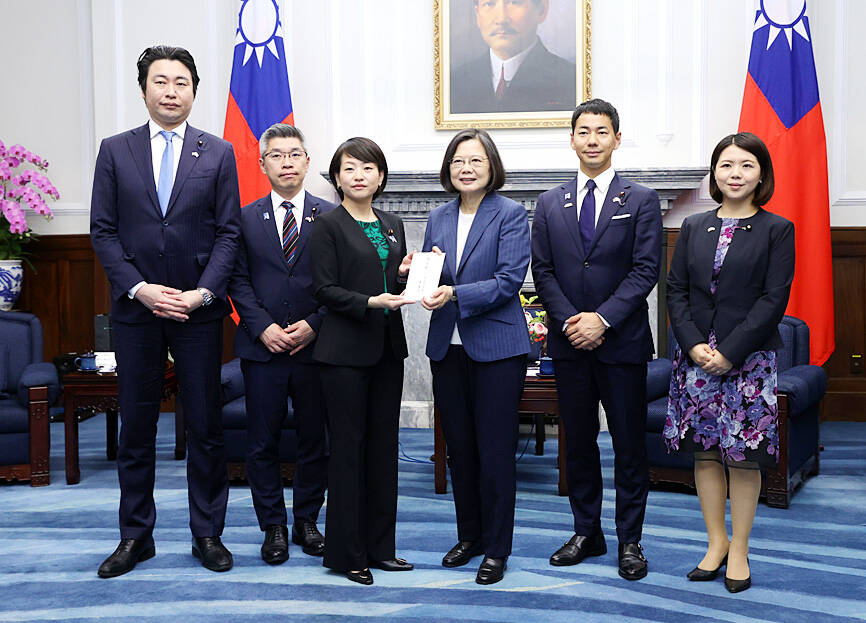The Youth Division of Japan’s ruling Liberal Democratic Party (LDP) is to continue promoting ties between Taiwan and Japan based on a solid foundation, Japanese Representative Takako Suzuki said yesterday.
Suzuki, who took over as division director in March, is leading a delegation of division members on a visit to Taiwan from Monday to Friday.
During a meeting with President Tsai Ing-wen (蔡英文) yesterday, Suzuki said it was meaningful to be able to express the delegation’s gratitude to Tsai in person for her leadership and efforts in promoting the Taiwan-Japan relationship over the past eight years.

Photo: CNA
“Any threat of force is unacceptable,” she said, echoing Tsai’s call for mutual respect in international society.
Powerful and warm appeals like this are great examples for all national leaders, she added.
As responsible young politicians, division members would continue to promote ties between Taipei and Tokyo, she said.
Taiwan and Japan share a solid, deep friendship, which was evident in the assistance they provided each other after major natural disasters such as the massive earthquake that struck Hualien County last month and the temblor that hit the Noto region of Japan’s Ishikawa Prefecture in January, she said.
On behalf of the LDP, Suzuki presented Tsai with a catalogue of Japanese donations for disaster relief after the Hualien earthquake.
Tsai thanked Japanese for their donations and concerns as well as the division for making regular visits to Taiwan to show support for the nation and maintain good relations between the two sides.
Japan has reiterated the importance of peace across the Taiwan Strait on many occasions, Tsai said, adding that Taiwan would continue working with Japan and democracies around the work to safeguard regional peace and prosperity.
Younger people such as members of the division should continue the efforts to promote regional peace and stability as well as ties between Taiwan and Japan, while bringing fresh creativity and energy, she said.
Tsai said she hoped the division could cooperate with more non-governmental organizations in Taiwan to deepen the bilateral relationship and realize the vision of a free and open Indo-Pacific region.
Earlier yesterday, the division met with Vice President William Lai (賴清德), who is to be sworn in as president on May 20.
Lai said he looks forward to further promoting cooperation between Taiwan and Japan, deepening people-to-people ties and bolstering economic development.
Suzuki said that the division, which consists of a responsible generation of politicians under the age of 45, looks forward to keeping up the cooperation with Taiwan to bring hope, peace and stability to the region.
Any advice from Lai and vice president-elect Hsiao Bi-khim (蕭美琴) would be welcomed, she added.
Yesterday evening, Suzuki told reporters at the Ministry of Foreign Affairs that the meetings with Tsai and Lai far exceeded the scheduled times and were “very fruitful.”
The dialogues have again made clear the importance of a stable relationship between Taiwan and Japan amid an ever-complicated and unstable international situation, she said.
Suzuki said that she invited Tsai on a road trip in her home island Hokkaido, or even around Japan, after leaving office later this month, as she heard that the president enjoys driving.

An undersea cable to Penghu County has been severed, the Ministry of Digital Affairs said today, with a Chinese-funded ship suspected of being responsible. It comes just a month after a Chinese ship was suspected of severing an undersea cable north of Keelung Harbor. The National Communications and Cyber Security Center received a report at 3:03am today from Chunghwa Telecom that the No. 3 cable from Taiwan to Penghu was severed 14.7km off the coast of Tainan, the Ministry of Digital Affairs said. The Coast Guard Administration (CGA) upon receiving a report from Chunghwa Telecom began to monitor the Togolese-flagged Hong Tai (宏泰)

A cat named Mikan (蜜柑) has brought in revenue of more than NT$10 million (US$305,390) for the Kaohsiung MRT last year. Mikan, born on April 4, 2020, was a stray cat before being adopted by personnel of Kaohsiung MRT’s Ciaotou Sugar Refinery Station. Mikan was named after a Japanese term for mandarin orange due to his color and because he looks like an orange when curled up. He was named “station master” of Ciaotou Sugar Refinery Station in September 2020, and has since become famous. With Kaohsiung MRT’s branding, along with the release of a set of cultural and creative products, station master Mikan

RISING TOURISM: A survey showed that tourist visits increased by 35 percent last year, while newly created attractions contributed almost half of the growth Changhua County’s Lukang Old Street (鹿港老街) and its surrounding historical area clinched first place among Taiwan’s most successful tourist attractions last year, while no location in eastern Taiwan achieved a spot in the top 20 list, the Tourism Administration said. The listing was created by the Tourism Administration’s Forward-looking Tourism Policy Research office. Last year, the Lukang Old Street and its surrounding area had 17.3 million visitors, more than the 16 million visitors for the Wenhua Road Night Market (文化路夜市) in Chiayi City and 14.5 million visitors at Tainan’s Anping (安平) historical area, it said. The Taipei 101 skyscraper and its environs —

Taiwan on Friday said a New Zealand hamburger restaurant has apologized for a racist remark to a Taiwanese customer after reports that it had first apologized to China sparked outrage in Taiwan. An image posted on Threads by a Taiwanese who ate at Fergburger in Queenstown showed that their receipt dated Sunday last week included the words “Ching Chang,” a racial slur. The Chinese Consulate-General in Christchurch in a statement on Thursday said it had received and accepted an apology from the restaurant over the incident. The comment triggered an online furor among Taiwanese who saw it as an insult to the